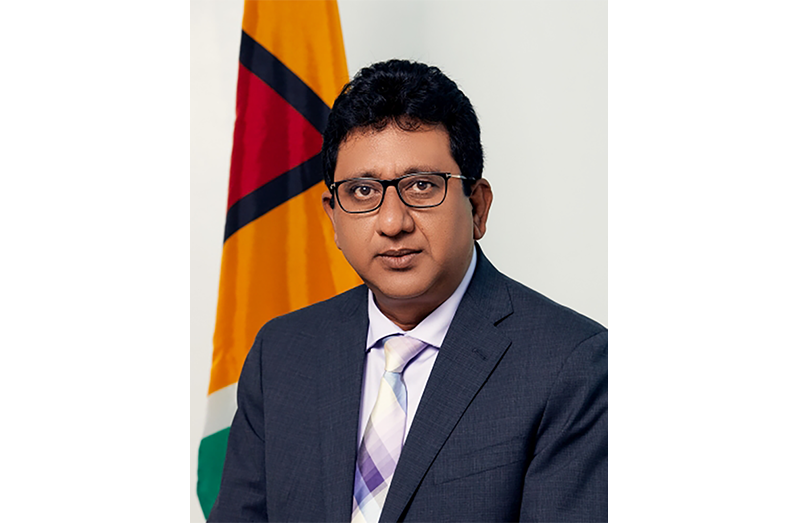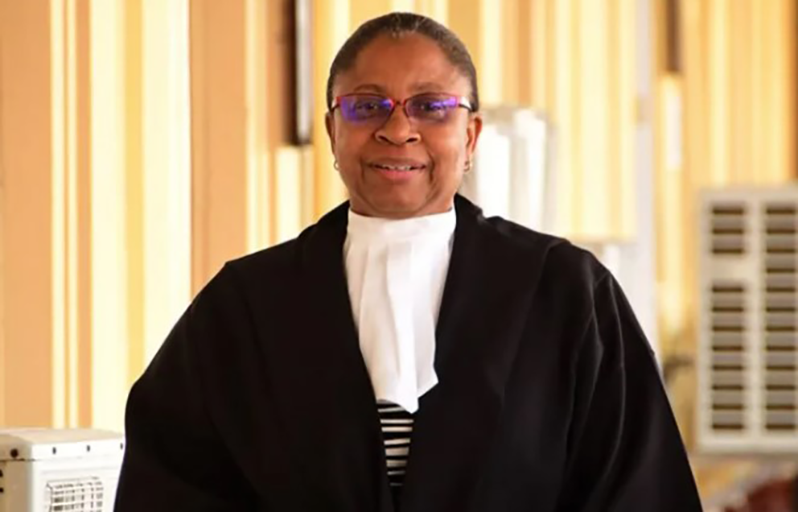–Chief Justice rules; says such a provision would disenfranchise voters
IN a lengthy judgement delivered on Thursday, acting Chief Justice Roxane George, SC, declared that there is no legal requirement for Guyanese citizens to be resident at a particular address in order to be registered on the National Register of Registrants (NRR), or to vote at the General and Regional Elections.
The decision was delivered in the case filed by People’s National Congress Reform (PNCR) Chief Scrutineer Carol Smith-Joseph (the applicant), who, among other things, asked the court to issue an order compelling the Guyana Elections Commission (GECOM) to verify a registrant was living at the address claimed for the purposes of inclusion in the National Register of Registrants (NRR) and for voting.
The NRR is a database managed by GECOM that records the names of individuals who are eligible to vote in General and Regional elections. This database serves as an official list of registered voters.
The PNCR member argued that verification was necessary due to concerns that some registered addresses either lack buildings entirely or contain abandoned or dilapidated structures where no one has lived for years.

She further argued that while some addresses exist, the registrants are unknown to the residents in the community, and others are merely general locations, such as the name of a village or area. Smith-Joseph, through her lawyers, submitted that this has resulted, and continues to result, in entries on the NRR that have effectively “contaminated” the database.
Addressing Smith-Joseph’s concerns, Justice George stated: “The applicant has produced no evidence to support the contention that there are persons found not to be located at the addresses stated in their registration information; i.e., they do not reside at the addresses claimed. The evidence produced is based on the applicant’s perceptions of what is or might be occurring.
“In my view, the address claimed has to be accepted. The registration officer cannot say to a person presenting themselves for registration that they do not accept the address given for whatever reason, and, therefore, disqualify the person for a first registration or registration of a change of address. To do so would be to disenfranchise persons, which would be unconstitutional,” Chief Justice George declared.
Furthermore, while Smith-Joseph acknowledged that residency is not a requirement for voting in General Elections, she argued that Article 73(1) of the Constitution of Guyana mandates citizens to reside in a specific region to vote in Regional Elections.
Based on this, she maintained that residency is a constitutional requirement for Regional Elections and asserted that the addresses provided by individuals registering to vote in these elections must be verified.
Article 73(1) states that “Members of a Regional Democratic Council shall be elected by persons residing in the Region and registered as electors for the purpose of Article 159.”
Article 159 sets out the qualification and disqualification for electors. Article 159(1) states that no person shall vote at an election unless he or she is registered as an elector.
Article 159(2) stipulates that to be eligible for voter registration, individuals must be at least 18 years old and either a citizen of Guyana by birth, descent, or naturalisation, or a Commonwealth citizen who has resided in Guyana for at least one year, provided they are not a citizen of Guyana.
This makes overseas-based Guyanese eligible to vote.
While Article 73(1) refers to persons “residing” in the region, she argued that Article 159(1) does not impose a residency requirement, and, therefore, contended that these two constitutional provisions are in conflict.
The court dismissed Smith-Joseph’s claim that these two constitutional provisions conflict with each other.
On this issue, the Chief Justice emphasised: “The residency information is captured on registration when a person gives their address. Thereafter, GECOM merely has to assign persons to the regions or other local government constituency or areas based on the addresses given or claimed. So, when on registration, one gives an address, this would determine one’s residence for the purposes of Local Government elections of which Regional Elections are a part.”
According to Justice George, the only logical conclusion is that the “residing” in Article 73(1) must be interpreted in the context of the address claimed—the address provided at the time of registration.
She, therefore, held that: “Articles 73(1) and 159(1) are not in conflict. The former identifies where one will exercise their right to vote, which is guaranteed by the latter. Parliament must have been aware of the intent of Article 159—more specifically, Article 159(1)—when it explicitly referred to Article 159 in Article 73(1).”
Justice George further noted that it would be illogical for Parliament, having removed the residency requirement from Article 159 in the 1980 Constitution, to have intended the creation of a separate registration process to verify addresses under Article 73(1), especially since both the General and Regional Elections rely on the Official List of Electors (OLE).
“Election laws of Guyana are clearly meant to provide minimal restriction on the eligibility of Guyanese regarding the right to vote. It simply places the onus on persons to get registered in the place of [their] choice regarding where they want to vote, so that the names can be included in the Official List of Electors—which is clearly meant to be the source list for all elections.”
In closing, the Chief Justice said that the order being sought by the applicant would mean asking the court to introduce a residency requirement—something this court has already ruled on—which would violate Article 159(1) of the Constitution.
“Article 159(1) is about the right to vote, while Article 73(1) is about where a person would exercise [that right]. So, the application is dismissed,” Justice George ruled.
She emphasised that a person’s name can only be removed from the voter’s list if they are deceased or otherwise disqualified under Article 159.
Moreover, the Chief Justice found that the issues raised in this case closely mirrored those in a previous case filed by Smith-Joseph in 2022. Considering this, the court ruled that she must pay costs, which will be assessed if not mutually agreed upon.

Attorney-General Anil Nandlall, SC, who had previously called for the case to be dismissed, reacted to the Chief Justice’s ruling in a Facebook post, stating: “In yet another elaborate and well-reasoned judgment, the CJ [Chief Justice] dismissed the PNC’s case, upholding all of our submissions; and confirms once again that there is no legal requirement for a Guyanese to be resident at a particular address in Guyana in order to be registered or to vote.
“The court labelled the case as an attempt to disenfranchise Guyanese and violate the doctrine of separation of powers.”
The Attorney-General was named as a respondent in the application, alongside GECOM, which was represented by its in-house attorney, Kurt Da Silva. Smith-Joseph was represented by Attorney Dexter Todd.



.jpg)









